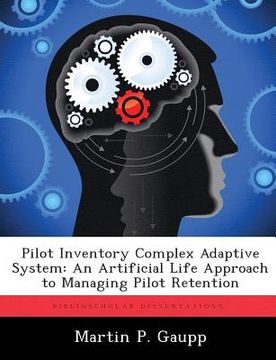Compartir
Pilot Inventory Complex Adaptive System: An Artificial Life Approach to Managing Pilot Retention (en Inglés)
Martin P. Gaupp
(Autor)
·
Biblioscholar
· Tapa Blanda
Pilot Inventory Complex Adaptive System: An Artificial Life Approach to Managing Pilot Retention (en Inglés) - Gaupp, Martin P.
$ 75.887
$ 126.479
Ahorras: $ 50.591
Elige la lista en la que quieres agregar tu producto o crea una nueva lista
✓ Producto agregado correctamente a la lista de deseos.
Ir a Mis Listas
Origen: Estados Unidos
(Costos de importación incluídos en el precio)
Se enviará desde nuestra bodega entre el
Lunes 29 de Julio y el
Miércoles 07 de Agosto.
Lo recibirás en cualquier lugar de Argentina entre 1 y 3 días hábiles luego del envío.
Reseña del libro "Pilot Inventory Complex Adaptive System: An Artificial Life Approach to Managing Pilot Retention (en Inglés)"
The retention of skilled pilots continues to be a problem that plagues the United States Air Force. After spending millions of dollars on training and education, it is disheartening to see the mass exodus of experienced aviators from the Air Force that has been occurring in the past decade. Many blame the economy, others the Air Force itself, but few are able to accurately predict how or why they are all leaving. The current personnel models do not adequately determine retention rates. Complex adaptive systems theory, however, might provide some insight. By modeling the system at the pilot's level, allowing each pilot to be represented as an autonomous, independent agent continually adapting to its environment and the other agents in it, an alternate model can be built; one that accounts for the interactions among the pilots, not just their interactions with their environment. PICAS (Pilot Inventory Complex Adaptive System) is just such a model. Constructed in the Java language, the PICAS model exploits the notions of complex adaptive systems theory and employs dynamic user controls to discern retention rates. Pilots 'evolve', for lack of a better word, to a greater fitness within their environment, and in the process the model user can better determine what kind of environment needs to be created and maintained in order to ensure that trained and experienced pilots are in fact retained for their services. This thesis will discuss the theory underlying the PICAS model, trace the development of the PICAS model, review the descriptive results the model produces, and finally investigate the uses of the model as a tool for exploratory modeling.
- 0% (0)
- 0% (0)
- 0% (0)
- 0% (0)
- 0% (0)
Todos los libros de nuestro catálogo son Originales.
El libro está escrito en Inglés.
La encuadernación de esta edición es Tapa Blanda.
✓ Producto agregado correctamente al carro, Ir a Pagar.

